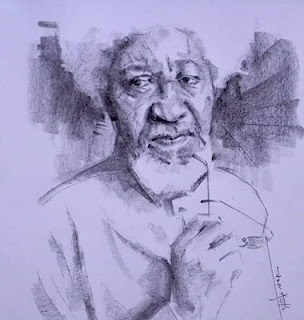Wole Soyinka and the Logic of a Democratic Ideal in a Postcolonial State By Prof. James Tar Tsaaior
Wole Soyinka is a study in exceptionalism. His exceptionalism as
Nigeria/Africa’s Nobel laureate is only equaled by a few Nigerians. Emeka Anyaoku,
for instance as Commonwealth Secretary-General, the late Chinua Achebe, his
fellow writer as the most read African novelist. Soyinka is also known globally
for his writings and political activism. However, his literary practice has
always come under intense interrogation by the critical establishment
especially the formation that identifies the lack of a clear, unambiguous
political dimension to his oeuvre.
In its discursive elaborations, this critical collective accuses
the Nobelist of investing enormous agency and epistemological capital in the
lone, individual figure who imposes on himself the exclusive preserve of
galvanizing society in the kinesis of history. Inevitably, the mass of the
collectivity and their communal aspirations and energies for the revolutionary
transformation of the patterns of social and cultural production are
subsidiarised to the will of the larger-than-life hero. Whether it is in his
dramaturgy or poetic output, this critical intellection has become definitive
of the attempts to come to grips with Soyinka’s writings.
The critical charge is that Soyinka is enamoured of lone,
individual subjectivities who impose the communal will upon themselves and
embody history without due recourse to the mass of the people who are the authentic
creators of history may be somewhat compelling. However, to pronounce Soyinka
guilty and to convict him of ahistoricity is to carry one’s luck too far.
Allied to this assumed deficit in apprehending the networks of historical
knowledge is the equally perennial accusation that Soyinka’s artistry does not
pursue progressive themes that are dialectical and materialist in character.
This too looks like training the arrow against a pin which is likely to be
missed.
This supposed absence of a progressive centre and ideological
gravitation to progressive possibilities in Soyinka’s poetics thus becomes the
overriding and informing concern which drives this interpretive current.
Interestingly, Nigeria’s present postcolonial contradictions issue directly
from this lack of a progressive vein in her politics, economics and culture. A
culture of elitist predation, oppression, exploitation and corruption has been
entrenched and celebrated as national pastime since independence in October
1960.
The critical skirmish concerning Soyinka strikes at the very
core of discourses which exist at the interface of the formalist and
functionalist approaches to literature and art: the autonomy of art as a
self-sufficient, aesthetic creation and its social/political functionality. I,
however, argue that Soyinka has always been a politically active and positioned
writer and that critical perspectives which negate this reality have neither
been charitable nor able to transcend the concrete dynamic of his art.
Indeed, not to appear to have
a clear political/ideological sympathy is itself a political rite. While it may
be somewhat difficult to delineate the fine details of the political lineaments
inherent in Soyinka’s creative writings, his essays constitute a more
crystallizing agent in the determination of his ideological intentions which
are thinly disguised in his creative sensibility. For instance, his collection
of essays, The Open Sore of a Continent contextualizes
and exemplifies Soyinka’s political activism as a writer.
One of the most vociferous and unsparing of the critics has been
Femi Osofisan who has interrogated Soyinka’s idealization and deification of
the lone, promethean individual who bears the burdens of history and takes on
the forces of society to the mutual exclusivity of the collectivity. Valorizing
a Marxist consciousness, Osofisan denounces Soyinka’s lack of recourse to clear
ideological mooring of his aesthetics in a collectivizing partisanship that
foregrounds and takes sides with the mass of the people and makes them the true
agents and subjectivities of history. Osofisan is particularly disturbed by
Soyinka’s deployment of animist metaphysics and the individual Promethean
protagonist theorized in Aristotelian poetics.
But Osofisan is not
alone. Biodun Jeyifo has also engaged in critical skirmishes with Soyinka’s oeuvre especially his dramaturgy and identified
its ideological limitations in elitist aesthetics. Jeyifo has deconstructed
Soyinka’s poetics based on his appropriation of cultural idioms and mythic knowledge
grids without fully acknowledging the functional role of the community as
veritable makers of history. His grouse pendulates between Soyinka’s
ahistoricism and lack of historical dialecticism especially concerning the
latter’s creative daemon, Ogun.
Jeyifo, therefore, rails Soyinka for literary idealization and
for lacking true revolutionary potential. At the interface of the two
deconstructive appraisals of Soyinka’s poetics, Promethean individualism and
the lack of dialectics of historicity are the animating concerns. Tejumola
Olaniyan pursues the argument in the same direction of the individuation of
history and its currents as hypostasised in the lone figure. Related to this
also is the subsidiarisation of the female principle to patriarchal power
structures in the gender politics that define the African cultural cartography
where women are rendered invisible and voiceless as manifested in the
thematisation of the god, Ogun.
It is ironic that Soyinka
is himself on the firing range concerning the cultural politics of Negritude of
which he has been a fierce critic. He is known to have famously characterised
the movement (with its arch-exponents such as Leopold Sedar Senghor, Aime
Cesaire and Leon Damas) as a tiger which does not need to proclaim its tigritude
but act it. What Soyinka perhaps does not appreciate is that before the leopard
can pounce, it must declare itself through its growls. The nativist
intellection of the bolekajatriumvirate of
Chinweizu, Onwuchekwa Jemie and Ihechukwu Madubuike has also been at the
receiving end of Soyinka’s polemics and rehearsed vitriol. Many of the critics,
however, have increasingly interrogated the fidelity of Soyinka’s cultural
politics to Africa, the home continent he claims to strenuously defend in his
literary and critical practice. READ MORE AT STORRIED.COM
James Tar Tsaaior, PhD
Professor of Media and Cultural
Communication,
School of Media and
Communication,
Pan-Atlantic University, Lagos


Comments
Post a Comment